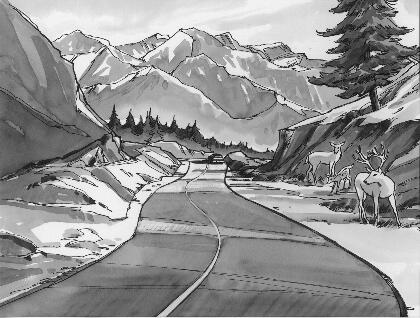
Driving on steep hills or mountains is different from driving in flat or rolling
terrain.
If you drive regularly in steep country, or if you are planning to visit there,
here are some tips that can make your trips safer and more enjoyable.
| • | Keep your vehicle in good shape. Check all fluid levels and also the brakes,
tires, cooling system, and transaxle. These parts can work hard on mountain roads. |
| • | Know how to go down hills. The most important thing to know is this: let
your engine do some of the slowing down. Shift to a lower gear when you go down a
steep or long hill. |
| | Caution: If you do not shift down, the brakes could get so hot
that they would not work well. You would then have poor braking or even none going
down a hill. You could crash. Shift down to let the engine assist the
brakes on a steep downhill slope.
|
| | Caution: Coasting
downhill in N (Neutral) or with the ignition off is dangerous. The brakes will have
to do all the work of slowing down and they could get so hot that they would not work
well. You would then have poor braking or even none going down a hill. You could crash.
Always have the engine running and the vehicle in gear when going downhill.
|
| • | Know how to go uphill. You may want to shift down to a lower gear. The
lower gears help cool your engine and transaxle, and you can climb the hill better. |
| • | Stay in your own lane when driving on two-lane roads in hills or mountains.
Do not swing wide or cut across the center of the road. Drive at speeds that let you
stay in your own lane. |
| • | As you go over the top of a hill, be alert. There could be something in
your lane, like a stalled car or an accident. |
| • | You may see highway signs on mountains that warn of special problems.
Examples are long grades, passing or no-passing zones, a falling rocks area, or winding
roads. Be alert to these and take appropriate action. |
Automatic Transaxle
If your vehicle has an electronic control automatic transaxle, it is equipped
with a control system which reduces excessive transaxle shifting while traveling up
and down hills.
Up Hill
The transaxle will not shift to a higher gear if the gear cannot maintain speed
on the grade. If you completely lift off the throttle and the transaxle does not upshift
on a steep grade, it is normal and the computer is preventing unnecessary shifting.
After reaching the top of the hill, the normal gear shift schedule will resume operation.
Driving Down Hills
If traveling down steep grades the computer may automatically select a lower
gear. This system assists engine braking, reduces transaxle shifting, and reduces
braking required while going down the hill.
Important: This system is intended to only supplement
and not replace driver selected gear pulldown in "3" (Third Gear) or "2"
(Second Gear).

